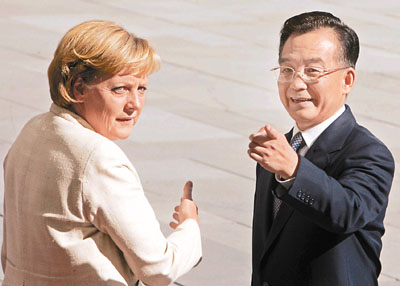What makes warming relations between China, Germany?
- By Li Mingbo
 0 Comment(s)
0 Comment(s) Print
Print E-mail People's Daily, September 6, 2012
E-mail People's Daily, September 6, 2012
|
 |
|
Sino-Germany relations have always been the most stable among bilateral relations between China and Western countries. [File photo] |
Over the past week, there were two major diplomatic events in China. German Chancellor Angela Merkel paid a visit to China and Tsuyoshi Yamaguchi, Japan's parliamentary senior deputy minister of foreign affairs, arrived in Beijing to hand a letter, written by Japanese Prime Minister Yoshihiko Noda and intended for President Hu Jintao. This year marks the 40th anniversary of normalization of diplomatic relations between China and Japan and the 40th anniversary of establishment of diplomatic relations between China and Germany. Why is there a sharp contrast between Sino-Japan and China-Germany relations?
Last week’s visit is Merkel’s sixth trip to China since she became German Chancellor. Frequent exchange of visits between Chinese and German senior officials indicates the rapid warming bilateral relations in which economy plays a major role. China will order 50 Airbus planes worth 3.5 billion U.S. dollars, only a part of more than 10 trade agreements two countries inked during Merkel’s visit.
Why are China-Germany relations healthier and more stable than Sino-Japan relations? Sino-Germany relations have always been the most stable among bilateral relations between China and Western countries. The Chinese people hold favorable views of Germany, especially Germans’ professionalism and world’s leading industrial manufacturing technologies. However, Sino-Japan relations have been repeatedly damaged by historical issues and territorial disputes. As the vanquished country in the Second World War like Germany, Japan should learn from it to deal with historical issues in a responsible and respectable manner.
Stable development of China-Germany relations will play an important role in re-shaping the global strategic landscape in the future. After reunification, Germany has devoted itself to the European integration and contributed significantly to the birth of the euro, becoming the center of Europe. The deteriorating European debt crisis has made Germany even more important, instead of weakening its strategic position. The rise of emerging market countries represented by China is changing the global strategic landscape, and the close Sino-Germany relations are particularly important in such a context. Germany is fully capable of playing a more important role in rebalancing the global strategic landscape in the future.
China-Germany relations have improved rapidly mainly because of their pursuit of economic interests. Germany has the technologies that China needs urgently while China can provide Germany with a huge market. The bilateral relations will become more stable if two sides reach more consensuses in political field.






Go to Forum >>0 Comment(s)